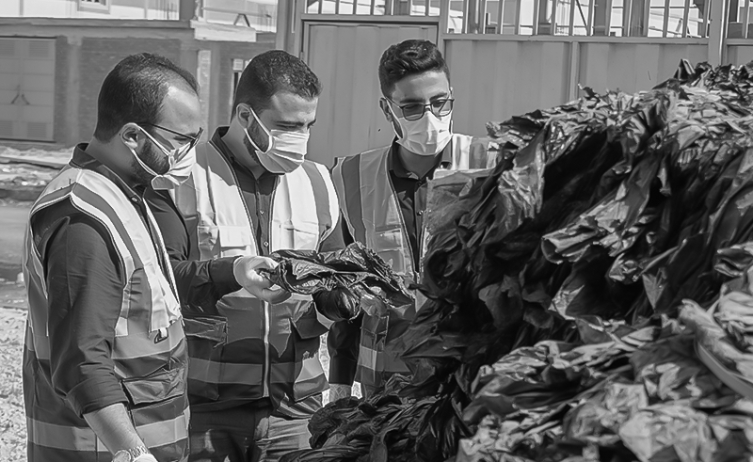How Egyptian Startup TileGreen is Creating Tiles From Plastic Waste
Egyptian startup TileGreen is on a mission to revolutionise the construction industry in the Middle East.

Since launching in 2021, Egyptian startup TileGreen has been turning millions of plastic bags into tiles to reduce plastic waste and high levels of emissions produced by the construction industry. Although it is less than two years old, the startup is already working with leading companies including real estate developer SODIC and other key players in the FMCG space, such as Nestle and Henkel.
After noticing that not all types of plastics can be safely recycled, Founders Khaled Raafat and Amr Shalan were determined to find new uses for the material. “So far, the recycling rate globally is 14% on average, which means more than 350 million annual tons of waste goes to landfills or are incinerated,” Amr Shalan, CEO and Co-Founder of TileGreen, tells StartupScene. “Of course, this causes serious environmental impact when it comes to plastic waste and emissions.”
At the same time, building sector emissions, particularly cement, represent an estimated 8% of CO2, far more than global carbon emissions from aviation, according to thinktank Chatham House.
In response to this growing need, the founders created TileGreen to provide the sector with building materials that are carbon-negative, economical and high performing. Since its launch, the startup has recycled more than 20 million plastic bags into building material, and aims to recycle five billion by 2025.
How it Works
To collect plastic bags, the startup first works with Egypt’s informal garbage collectors, who are estimated to collect about 50% of the country’s municipal waste.
Once collected, the plastic bags are sent to the company’s factory in the outskirts of Cairo, where they are cleaned and ready to be compressed into tiles. “For the plastic to be made in any other product, it needs to undergo treatment,” explains Shalan. “The next step is the mixing of plastics, before it is processed to produce the final product, tiles.”
The tiles are then sold to real estate developers and contracting companies in Egypt, and more recently across the MENA region.
According to Shalan, the startup was able to attract clients organically. “Customers need something like this,” he says. “We didn’t need to push, because the need is there. The projects we work on also help our customers reach their own environmental goals.” For instance, working on a project with SODIC helped the developer save 350,000 plastic bags and reduce 11 tons of CO2, according to Shalan.
With the region’s growing interest in sustainability, especially after Egypt hosted COP27 in 2022, and Dubai was tapped to host COP28 later in 2023, more companies are now paying greater attention to their environmental impact and carbon footprint.
NASCENT INDUSTRY
While the cleantech industry may be booming globally - funding reached $82 billion in 2022, which was a 19.4% increase from 2021, according to data by Net0 Insights - the sector is still nascent in the Middle East.
“Investment in cleantech hardware in MENA is very difficult,” he says. “If it was the same effort, same team and the same demand, but we were working in the digital landscape, we could have exited by now.”
TileGreen, however, didn’t initially struggle with fundraising. The startup raised three rounds of investments of more than $300K, in addition to receiving grants from the EU and European financial institutions.
Regardless, Shalan wants cleantech to catch up quickly in the region before it’s too late. “We need to look ten years ahead,” he says. “If we look at the patterns in Silicon Valley and Europe, we will find that the things that we are investing in now were the hype there in 2005. However, the hype today is in a different place, and it won’t reach us, except maybe in ten years, but by that time, it will be too late.”
Shalan believes that in order to have net zero emissions by 2050, as stipulated in the Paris Agreement, the construction industry needs to start going green no later than 2025. “The average lifespan of a building is 25 years, so unless the buildings in 2025 are green from the beginning, we already missed the deadline,” he says.
LOOKING BEYOND TILES
Today, TileGreen may be known for creating tiles from plastic bags, but the startup is also expanding to make other green building materials from plastic waste.
“We consider what we did as the first step,” Shalan says. “We want to manufacture other products to solve the problem of waste in general, and provide different solutions to the construction industry.”
TileGreen aims to do that by continuously testing and experimenting with recycling different types of plastic waste, even the ones deemed ‘unrecyclable,’ to replace traditional building materials with more eco-friendly and sustainable products. As such, the startup is scaling its production capacity by the end of 2024, as well as eyeing expansion in the Middle East and Africa over the next five years. “We want to be in the Middle East and Africa in at least five countries, with at least five products, and we are already on track to do this,” Shalan says. “Ultimately, however, our target is for TileGreen to be the go to company for carbon negative building materials made from waste streams. We have to use these resources, and these are problems we have to solve.”
- Previous Article What’s Driving BNPL Growth in the MENA Region?
- Next Article Egyptian E-Payment Platform Fawry Will Launch Digital Bank in 2023




















